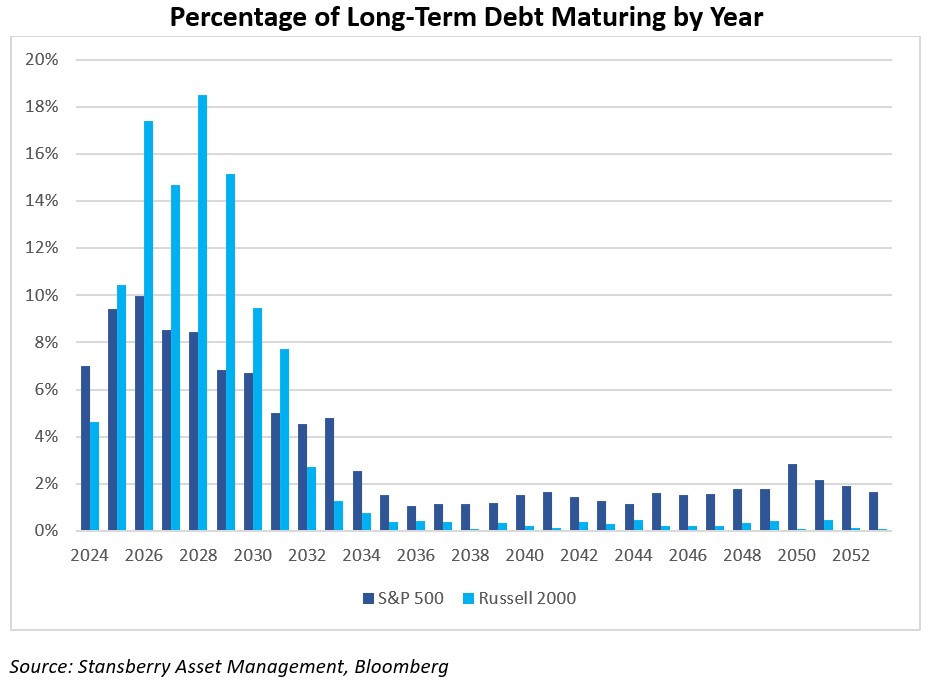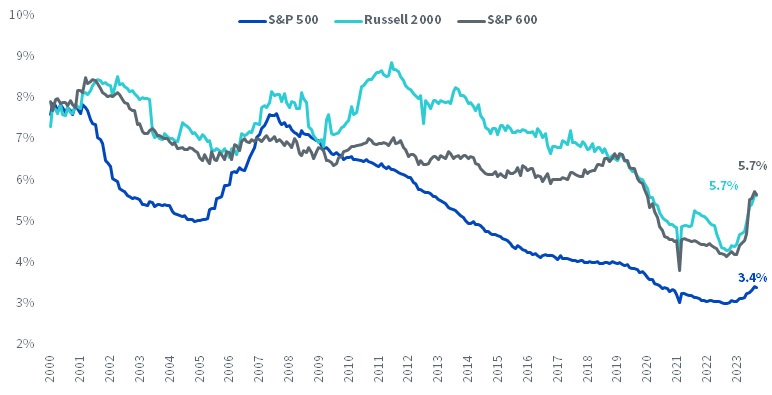
We’re well into the new year now, and investors are naturally wondering which investments will prosper in the months ahead. With the Magnificent 7 stocks (that is, Alphabet, Amazon, Apple, Meta Platforms, Microsoft, NVIDIA and Tesla) making up the bulk of 2023’s market gains, many are expecting broader participation from the rest of the market.
Small-caps in particular seem overdue to outperform. Their rally at the end of the year might seem to be confirmation of that idea, but even with the year-end push, small-cap stocks are trading at a significant discount.
I know it’s tempting to dive in. But investors should always be aware of risk. That’s particularly true if you’re retired or close to retirement. Simply put, you don’t have much time to make up for mistakes. And getting overly excited about small-caps could be a mistake.
Cheap stocks are often cheap for a reason. That certainly appears to be the case with small-cap stocks today.
Larger companies more likely to have lower rates locked in
For starters, there’s debt. Generally, bigger companies have much less debt maturing in the near future. Over the past few years, the majority of U.S. homeowners locked in low-rate mortgages. They will enjoy the benefits of that decision for years to come. It’s the same with large companies that have locked in long-term debt at favorable rates.

Smaller companies, on the other hand, don’t have the same access to bond markets for raising long-term debt. They generally use bank lines of credit and shorter-term sources of liquidity. That means their debt is being repriced at substantially higher interest rates, which is a headwind to profits.
Average Interest Rate Paid on Debt

As shown in the chart above, the interest cost over the past year for large-cap companies (S&P 500) is notably lower than for small-cap companies in the S&P 600 and Russell 2000. For weaker companies, higher rates could mean the difference between being profitable or in the red, especially in a recession.
Many smaller companies are unprofitable
Speaking of in the red, did you know that 40% of companies in the small-cap Russell 2000 index are unprofitable today? And that’s with a pretty strong economy. For now. Consumer credit card delinquencies and auto loan defaults are spiking. Bankruptcies are on the rise, as are delinquent commercial real estate loans. These are certainly signs that we may be in for more challenging times, if not an outright recession.
Higher rates plus a slowing economy could mean a spike in bankruptcies in the small-cap universe. But there’s good news: There are some great small-cap stocks out there! Not every small-cap company is drowning in debt, and in some niche areas, smaller companies can be industry leaders. They’re often overlooked — especially in an environment like today when the biggest stocks are getting all the attention.
If you are a roll-up-your-sleeves investor (or have a financial adviser who is), you may be able to find some wonderful businesses at attractive prices. However, if you or your adviser are the type to buy mutual funds and ETFs that own hundreds of positions, be careful. If those funds are broadly invested across the small-cap universe, you may be exposed to a collection of unprofitable and highly levered companies. If we head into slower economic times, what looks cheap today may cost you dearly.







